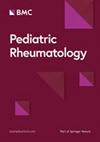家族性地中海热患儿的持续发热性肌痛综合征--系统综述和病例报告
IF 2.8
3区 医学
Q1 PEDIATRICS
引用次数: 0
摘要
持续发热性肌痛综合征(PFMS)是家族性地中海热(FMF)的一种罕见表现,以持续数周的肌痛、发热和炎症指标升高为特征。由于 FMF 的特征是疾病症状发作时间短,因此 PFMS 持续时间长可能会导致诊断和治疗延误。1.对文献和风湿病学教科书进行回顾,重点关注儿童 PFMS 的临床特征和治疗。2.介绍我们自己的病例。收集了以 "持久发热性肌痛 "为关键词在 Pub Med 上发表的所有文章,以及七本风湿病学教科书中有关 PFMS 的信息。在系统性综述的基础上,我们对自己的病例进行了补充。共检索到 18 篇文章,涉及 78 名儿科患者(包括我们自己的患者)。半数以上的患者以 PFMS 作为 FMF 的首发表现。所有患者均主诉肌痛,65%主诉腹痛,26%主诉皮疹。皮质类固醇(CS)对77%的患者有效。在所有CS难治性病例中,阿那金拉均显示有效。对 5 名患者使用了核磁共振成像,结果显示所有患者都出现了肌炎。对七本风湿病学教科书的仔细研究表明,有六本教科书提到了出现肌痛的 PFMS。可能的伴随症状只出现过一次,症状持续时间长出现过两次,皮质类固醇的疗效出现过三次,而阿纳金拉只出现过一次。这位 6 岁的患者表现为发热、肌痛、腹痛和瘀斑性皮疹,持续 6 周。在她的父母提到其家族有 FMF 阳性病史之前,她已经接受了多种诊断程序。随后的基因检测证实,她的 MEFV 基因存在 M694V 致病变异。PFMS 的持续时间较长,可能会误导临床医生,尤其是当 PFMS 发生在 FMF 出现时。半数以上的报告患者以 PFMS 作为 FMF 的首发症状,这是我们研究的主要发现之一。我们的病例展示了对疑似自身炎症性疾病进行早期基因检测的重要性。此外,核磁共振成像可能是显示 PFMS 肌炎的重要诊断工具。本文章由计算机程序翻译,如有差异,请以英文原文为准。
Protracted febrile myalgia syndrome in children with familial Mediterranean fever – systematic review and a case report
Protracted febrile myalgia syndrome (PFMS) is a rare manifestation of familial Mediterranean fever (FMF), characterized by myalgia, fever and elevated inflammatory markers lasting several weeks. As the hallmark of FMF are short episodes of disease symptoms, the long duration of PFMS may lead to a delayed diagnosis and treatment. 1. To perform a review of literature and rheumatology textbooks focused on clinical features and treatment of PFMS in children. 2. To present our own case. All articles in Pub Med generated using the keywords “protracted febrile myalgia” and information on PFMS in seven rheumatology textbooks were collected. The systematic review was supplemented with our own case presentation. In total, 18 articles with 78 pediatric patients (including our own) were retrieved. More than half of the patients presented with PFMS as the first manifestation of FMF. All complained of myalgia, 65% of abdominal pain and 26% had a rash. Corticosteroids (CS) were effective in 77%. In all CS-refractory cases, anakinra was shown efficient. MRI was used in 5 patients and showed myositis in all of them. The scrutiny of seven rheumatology textbooks showed that PFMS presenting with myalgia was mentioned in six. Possible accompanying symptoms were described only once, the long duration of symptoms twice, the efficacy of corticosteroids three times and anakinra only once. The presented 6 year old patient manifested with fever, myalgia, abdominal pain and petechial rash lasting 6 weeks. She had undergone multiple diagnostic procedures before her parents mentioned a positive family history for FMF. The subsequent genetic testing confirmed a homozygosity for M694V pathogenic variant in the MEFV gene. The long duration of PFMS may be misleading to clinicians especially if PFMS occurs at manifestation of FMF. The fact that more than half of the reported patients experienced PFMS as the presenting symptom of FMF is one of the key findings of our study. Our case presentation demonstrates the importance of genetic testing early in suspected autoinflammatory diseases. Furthermore, MRI may be an important diagnostic tool showing myositis in PFMS.
求助全文
通过发布文献求助,成功后即可免费获取论文全文。
去求助
来源期刊

Pediatric Rheumatology
PEDIATRICS-RHEUMATOLOGY
CiteScore
4.10
自引率
8.00%
发文量
95
审稿时长
>12 weeks
期刊介绍:
Pediatric Rheumatology is an open access, peer-reviewed, online journal encompassing all aspects of clinical and basic research related to pediatric rheumatology and allied subjects.
The journal’s scope of diseases and syndromes include musculoskeletal pain syndromes, rheumatic fever and post-streptococcal syndromes, juvenile idiopathic arthritis, systemic lupus erythematosus, juvenile dermatomyositis, local and systemic scleroderma, Kawasaki disease, Henoch-Schonlein purpura and other vasculitides, sarcoidosis, inherited musculoskeletal syndromes, autoinflammatory syndromes, and others.
 求助内容:
求助内容: 应助结果提醒方式:
应助结果提醒方式:


